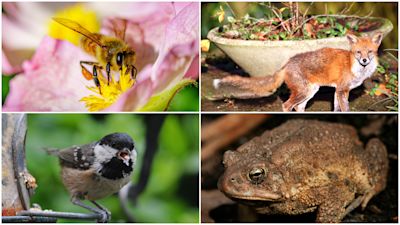Explainer
How to help wildlife keep cool and safe during the UK heatwave

The UK is experiencing another heatwave, with a week of 30C temperatures forecast with highs of 36C predicted in some places.
Such extreme heat can pose difficulty for wildlife as dehydration and heat exhaustion can be deadly.
Dehydrated hedgehogs, baby birds and fox cubs were among the casualties helped by the RSPCA in July's record-breaking spell of hot weather.
Fortunately, you can lend a helping hand in a few simple ways:
Providing fresh water
As water is scarce in a heatwave, the Royal Society for the Protection of Birds (RSPB) recommends giving wildlife a drink or a bath as the perfect way to help them keep cool.
This could be done by putting out a shallow dish or a bird bath - both of which will likely be used by birds, but also by other animals like butterflies and hedgehogs, as well as invertebrates.
Birds need water to bathe in to keep their feathers in good condition, so it is best to top yours up regularly with fresh, clean water.
"Adding a few stones to the edge of your water source can help ensure that butterflies and other flying visitors can perch while they drink, as well as allowing easy access for creatures such as hedgehogs, frogs and toads," the RSPB advises.
Experts have also advised people not to waste water on lawns, which will grow back when it eventually rains.
Giving out food
Some animals struggle to find natural sources of water during heatwaves, and the ground is so dry and hard that their natural food becomes hard to gather.
Putting out food - such as soaked raisins, apple pieces and pear - are good ways to keep birds and other animals hydrated.
But raisins can be harmful to dogs and cats, so people should not leave them out where pets may eat them, the Berkshire, Buckinghamshire & Oxfordshire Wildlife Trust said.
Hedgehogs, foxes and badgers are not fussy and will enjoy tinned cat or dog food, which provides vital moisture and nutrition.
If you normally feed the birds, make sure your feeders are well stocked.
Bees can become exhausted and may lay on the ground to recover in hot weather.
Giving them a water and sugar solution can boost their energy enough to help them fly back to their hive.
Providing refuge
Amphibians are especially susceptible to dehydration because they lose moisture extremely quickly through their skin.
Logs, stone slabs, rockeries and tall grass can provide vital refuge for frogs, toads and newts looking to escape the sun for a few hours.
Small creatures - such as hedgehogs - may need you to cut a small hole in the fence to access your garden.
Resist the temptation to trim as wilder areas in the garden will provide shelter for a wide range of wildlife, as uncut plants will provide refuge, and food if they have gone to seed.
Want a quick and expert briefing on the biggest news stories? Listen to our latest podcasts to find out What You Need To Know
Wildlife experts warn that urgent action is needed to help protect parched landscapes and rivers to help our natural environment become more resilient to future weather extremes brought on by climate change. “Food and water are critical for wildlife, birds and badgers are struggling to find worms which are burrowing deeper into the dry earth to find moisture," Ali Morse, water policy manager for The Wildlife Trusts, told ITV News.
"Nectar-giving flowers are shrivelling in the heat, and bees, butterflies and other insects, which are crucial to the food chain, are losing out.
"In rivers, low flows mean pollution is becoming more concentrated, and higher water temperatures stress fish." She added: “Water bosses should unite and impose a country-wide hosepipe ban to reduce non-essential use and avoid the worst impacts of drought on rivers and wildlife, rather than relying on more damaging measures later."
If you find a wild animal in distress during the heatwave, you can call the RSPCA helpline on 03001234999.